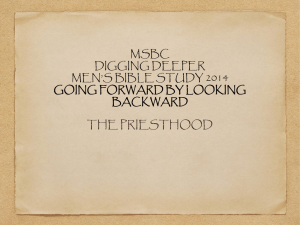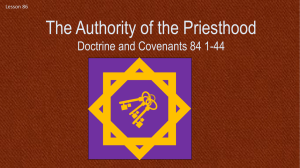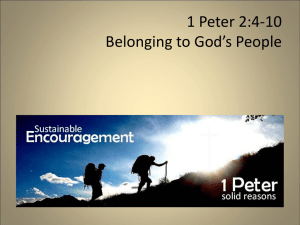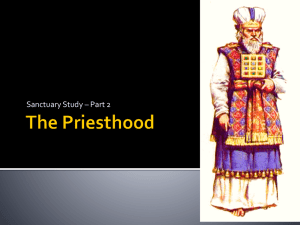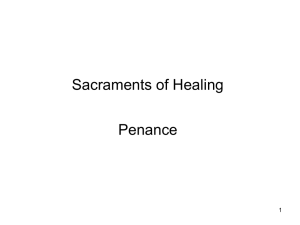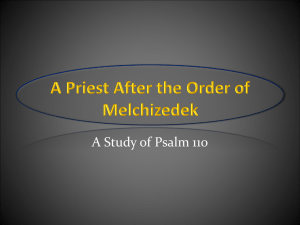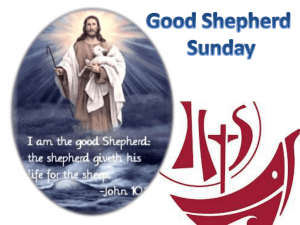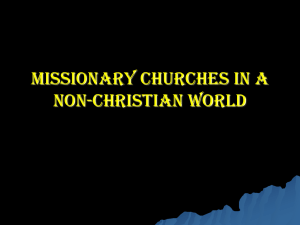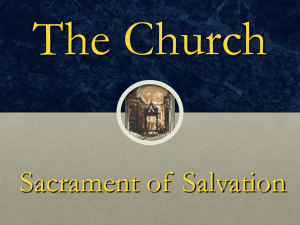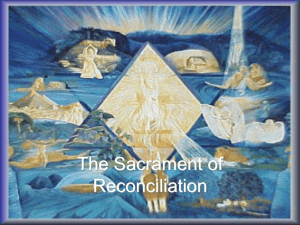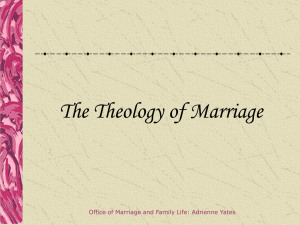Moroni 1-6
advertisement
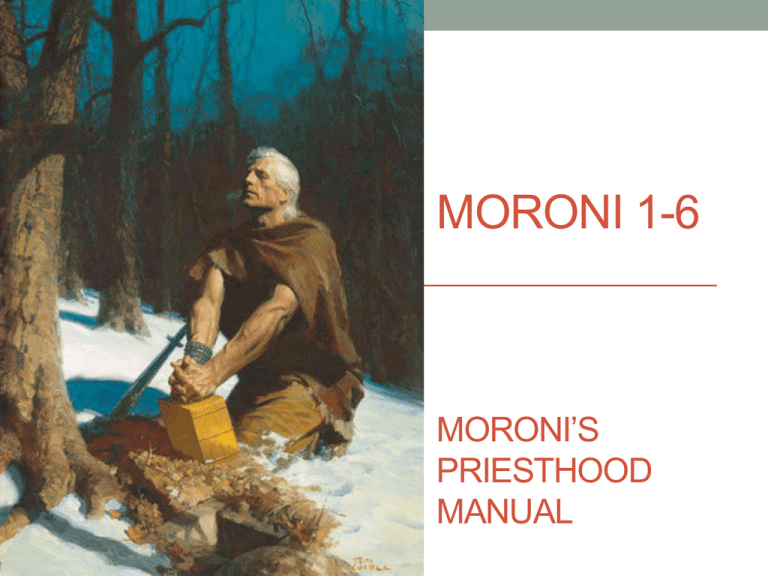
MORONI 1-6 MORONI’S PRIESTHOOD MANUAL PRIESTHOOD IQ Study your priesthood ordinance (or meeting) for 3-5 mins and then be prepared to precisely articulate the exact process: • Baptism (Moroni 6:1-5) • Confirmation (Moroni 2:1-3) • Priesthood Ordination (Moroni 3:1-4) • Sacrament Administration (Moroni 4-5) • The Purpose of Sacrament Meeting (Moroni 6:5-6,9) • Bonus: How to conduct Sacrament Meetings on Fast Sunday Moroni 6:1-5 HANDBOOK 2, 20.3.8 A priest or Melchizedek Priesthood holder: 1. Stands in the water with the person to be baptized. 2. Holds the person’s right wrist with his left hand; the person who is being baptized holds the priesthood holder’s left wrist. 3. Raises his right arm to the square. 4. States the person’s full name and says, “Having been commissioned of Jesus Christ, I baptize you in the name of the Father, and of the Son, and of the Holy Ghost. Amen” (D&C 20:73). 5. Has the person hold his or her nose with the right hand; then the priesthood holder places his right hand high on the person’s back and immerses the person completely, including the person’s clothing. 6. Helps the person come up out of the water. Moroni 2:1-3 HANDBOOK 2, 20.3.10 Melchizedek Priesthood holder: 1. States the person’s full name. 2. States that the ordinance is performed by the authority of the Melchizedek Priesthood. 3. Confirms the person a member of The Church. 4. Uses the words “Receive the Holy Ghost” (not “receive the gift of the Holy Ghost”). 5. Gives words of blessing as the Spirit directs. 6. Closes in the name of Jesus Christ. Moroni 3:1-4 HANDBOOK 2, 20.7.1 To participate in an ordination, a person must (1) be a priest or Melchizedek Priesthood holder and (2) have equal or higher priesthood authority than is to be given in the ordinance. For instance, an elder should not stand in the circle when a high priest is ordained. Moroni 3:1-4 HANDBOOK 2, 20.7.1 1. Calls the person by his full name. 2. States the authority by which the ordination is performed. 3. Confers the Aaronic or Melchizedek Priesthood, unless it has already been conferred. 4. Ordains the person to an office and bestows the rights, powers, and authority of that office. 5. Gives words of blessing as the Spirit directs. 6. Closes in the name of Jesus Christ. Moroni 4-5 HANDBOOK 2, 20.4.3 As the congregation sings the sacrament hymn, the priesthood holders who will bless the sacrament reverently stand, remove the cloth that covers the bread trays, and break the bread into bite-sized pieces. When they finish breaking the bread, they sit down and join in singing the hymn. Following the hymn, the person who blesses the bread kneels and offers the sacrament prayer for the bread. The bishop makes sure they are spoken clearly, accurately, and with dignity. Moroni 4-5 HANDBOOK 2, 20.4.3 If the person who blesses the sacrament makes an error in the wording but corrects it himself, no further correction is required. If the person does not correct an error, the bishop indicates that he should repeat the prayer correctly. After the prayer, deacons or other priesthood holders pass the bread to the congregation in a reverent and orderly manner. The presiding officer receives the sacrament first. The Sacrament The sacrament Hymn has just concluded and everyone has listened to the blessing on the sacrament. A Deacon is coming with the sacrament and you are about to take it. • What do you think about? • What distractions do you try to avoid? • What do you do to help you focus on the Savior? • What promises are you about to make? • What blessings can you receive from this experience? Moroni 6:5-6, 9 HANDBOOK 2, 18.2.2 Each sacrament meeting should be a spiritual experience in which members of the Church renew their covenants by partaking of the sacrament. Other purposes of sacrament meeting are to worship, provide gospel instruction, perform ordinances, conduct ward business, and strengthen faith and testimony. Moroni 6:5-6, 9 HANDBOOK 2, 18.2.3 Fast and Testimony Meeting is usually on the first Sunday of each month. After the sacrament, the bishopric member who is conducting the meeting bears a brief testimony. He then invites members to bear heartfelt testimonies and to relate faithpromoting experiences. The bishopric encourages members to keep their testimonies brief so more people may have the opportunity to participate. Moroni 6 “Many years ago, large packs of wolves roamed the countryside in Ukraine, making travel in that part of the world very dangerous. These wolf packs were fearless. They were not intimidated by people or by any of the weapons available at that time. The only thing that seemed to frighten them was fire. Consequently, travelers who found themselves away from cities developed the common practice of building a large bonfire and keeping it burning through the night. As long as the fire burned brightly, the wolves stayed away. But if it were allowed to burn out and die, the wolves would move in for an attack. Travelers understood that building and maintaining a roaring bonfire was not just a matter of convenience or comfort; it was a matter of survival. Moroni 6 “We do not have to protect ourselves from wolf packs as we travel the road of life today, but, in a spiritual sense, we do face the devious wolves of Satan in the forms of temptation, evil, and sin. We live in dangerous times when these ravenous wolves roam the spiritual countryside in search of those who may be weak in faith or feeble in their conviction. We are all vulnerable to attack. However, we can fortify ourselves with the protection provided by a burning testimony that, like a bonfire, has been built adequately and maintained carefully. “Unfortunately, some in the Church may believe sincerely that their testimony is a raging bonfire when it really is little more than the faint flickering of a candle. Their faithfulness has more to do with habit than holiness. With such a feeble light of testimony for protection, these travelers on life’s highways are easy prey for the wolves of the adversary” (Elder Wirthlin, in Conference Report, Oct. 1992, 45–46; or Ensign, Nov. 1992, 34). Moroni 6:7-8 HANDBOOK 1, 6.1.1 Church Discipline The first purpose of Church discipline is to save the souls of transgressors by helping them repent. Church discipline can facilitate repentance by helping transgressors recognize and forsake sin, seek forgiveness, make restitution, and demonstrate a renewed commitment to keep the commandments. Moroni 6:7-8 HANDBOOK 1, 6.1.2-3 The second purpose of Church discipline is to protect the innocent. With inspiration, a priesthood leader should act to protect others when a transgressor poses a physical or spiritual threat to them. The third purpose of Church discipline is to safeguard the purity, integrity, and good name of the Church. BLESSINGS OF THE PRIESTHOOD http://www.youtube.com/watch?v=INO0zl0g9sc IN DA HOOD • What does the Suffix “hood” means? • Hood = Added as a suffix, it shows a current condition or • • • • state Motherhood = A condition or state of being a Mother Fatherhood = A condition or state of being a Father Childhood = A condition or state of being a child Neighborhood = The condition or state of being neighbors in a proximity IN DA HOOD • What is does Priesthood mean? • Answer: The quality or state of being a Priest. • Ask: What is a Priest? • Look Up: ”Priest” in the Bible Dictionary. • Priests are mediators between us and God. • Priesthood = The condition or state of being mediators between man and God and helping save us. • Young Men: Are you living your life in a way so that you are acting as a mediator between man and God? • GIRLS: • BOYS: • What difference should • How should holding the the priesthood make to the young men? • In what subtle ways to young men dishonor their priesthood? • How important is it for your to have a faithful priesthood honoring husband? priesthood make you different? • How important do you think the priesthood will be for your future spouse? • What are some of the most common ways we honor the priesthood? MORONI 1-6 Priesthood of God
